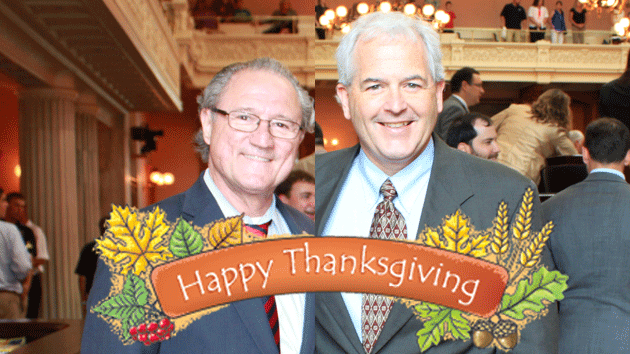
Ohio state Reps. Robert Hagan and Mike Foley<a href="http://www.shutterstock.com/cat.mhtml?country_code=US&page_number=1&position=6&safesearch=1&search_group=vectors%2C&search_language=en&search_source=search_form&search_type=keyword_search&searchterm=happy%20thanksgiving&sort_method=popular&source=search×tamp=1416611537&tracking_id=twfA6VCSgmcDMYs67uUphA&use_local_boost=1&version=llv1&page=1&inline=221794324">Birdydiz</a>/Shutterstock
In recent years, more and more big-box retailers have begun forcing their employees to work on Thanksgiving Day. Now, some Ohio state legislators have had enough. They’re introducing bills that would give workers the right to refuse to punch in on Thanksgiving, and, if they do agree to show up on the holiday, to receive substantial overtime pay.
“Thanksgiving Day is supposed to be a day when we retreat from consumerism,” says Cleveland’s Democratic state Rep. Mike Foley, the author of one such bill. “It’s a day when you hang out with your family, go play touch football, have a big turkey dinner, and complain about your crazy uncle or cousin—but you don’t think about super blockbuster sales at Target.”
Foley’s House Bill 360 would allow stores to open on Turkey Day but ban them from retaliating against workers who opt to stay home with their families. Workers who do show up would be guaranteed triple wages—which would also apply on Black Friday if stores open earlier than normal (12:01 a.m. and earlier openings have become common).
Foley says he was inspired to write the bill last year while leafing through newspaper circulars advertising Thanksgiving Day sales. “My wife said, ‘You’re a legislator, do something about this,'” he recalls. “And I thought, ‘Well, I am.'”
If employers want to treat Thanksgiving as “an opportunity to make money or get above the black line, so be it,” say Democratic Rep. Robert Hagan, the bill’s cosponsor. “But the fact still remains that they have that responsibility to take care of their workers.”
In Middletown, Connecticut, Democratic state Rep. Matt Lesser has pledged to introduce a similar bill next year. “The idea is to discourage retailers” from opening on Thanksgiving, he told the Hartford Courant. “And if they do require their workers to come in on Thanksgiving, that they would at least be paid overtime to compensate.”
Laws restricting Thanksgiving Day commerce aren’t without precedent. For decades, Massachusetts, Maine, and Rhode Island have completely banned most retailers from opening their doors on Thanksgiving and Christmas. The rules date back to colonial-era “blue laws” that restricted commercial activity on Sundays. More recently, some labor advocates have called for a federal blue law to protect Christmas and Thanksgiving. (Don’t hold your breath).
Although the GOP likes to think of itself as the party of family values, Foley and Hagan say that the Republicans who control the Ohio Legislature want nothing to do with their Thanksgiving law. Their bill, first introduced last year, was quickly tabled. It’s not expected to come up for a vote this year either. “They are on the side of the retailers, the restaurant owners, the people making the money, as opposed to working families,” Hagan says. “That’s the bottom line.”
Still, the backlash against Turkey Day retail has gained some steam. The Boycott Black Thursday Facebook page has more than 100,000 likes. And more than two-dozen retail chains plan to stay dark on Thanksgiving this year, including Barnes & Noble, Bed Bath & Beyond, Dillard’s, Nordstrom, GameStop, and Costco. “We don’t believe that we will lose ground to competitors,” GameStop president Tony Bartel told the New York Times. “Even if we lose ground to competitors, we are making it corporate principle—we have committed to associates that we will not open on Thanksgiving.”
















